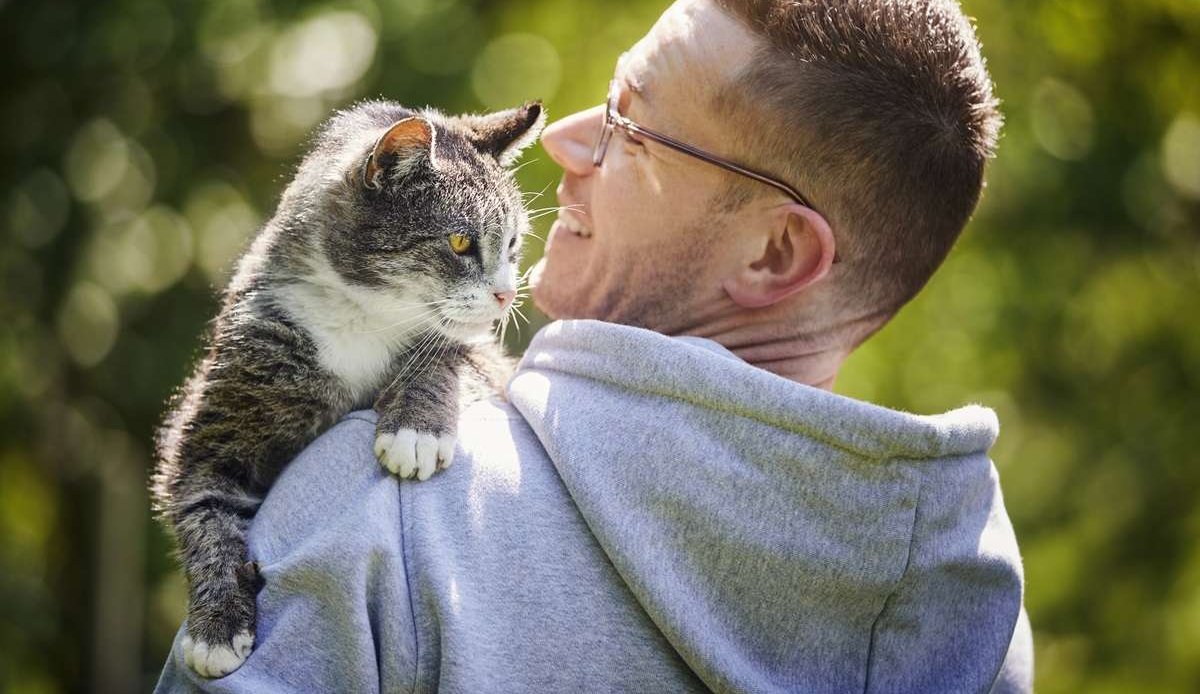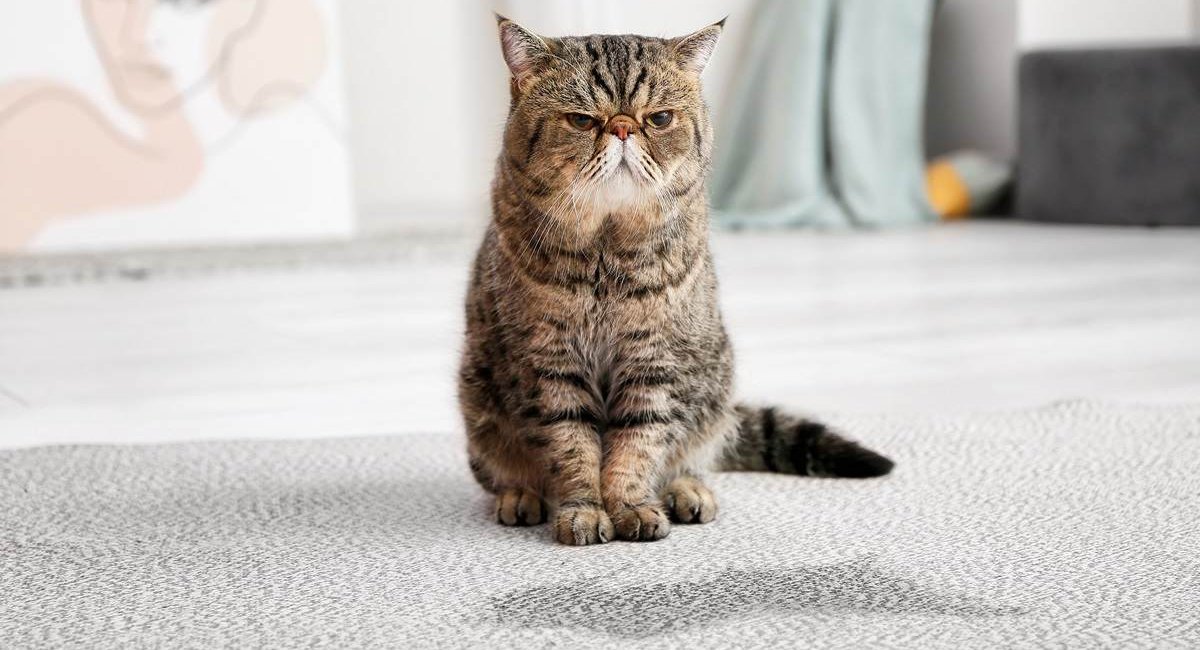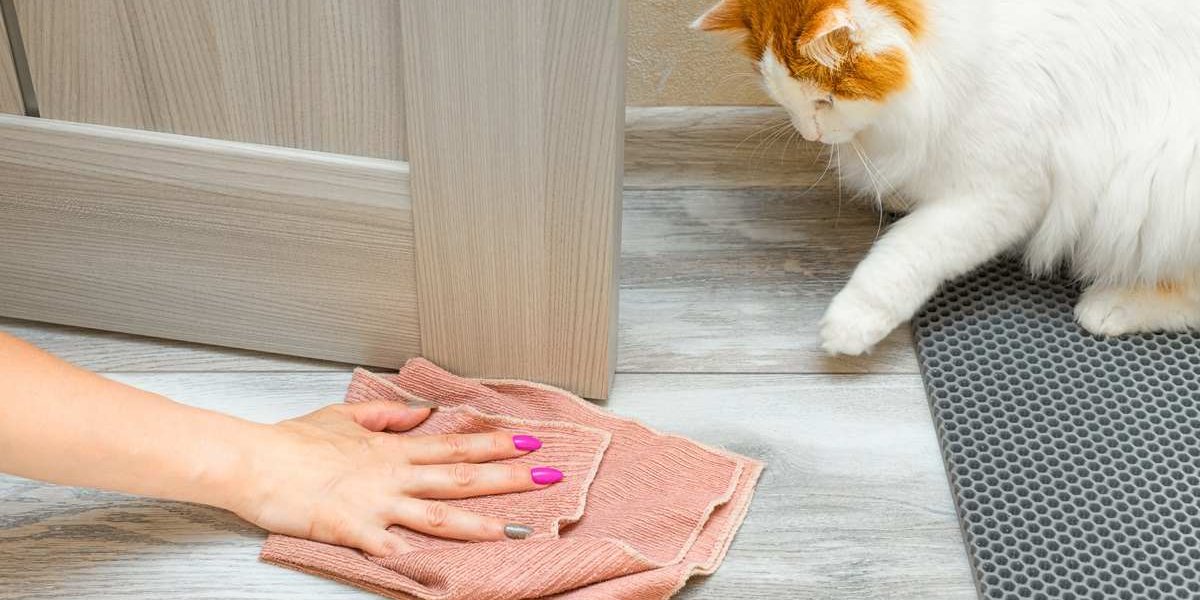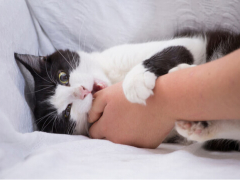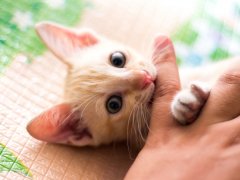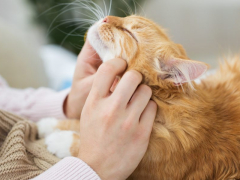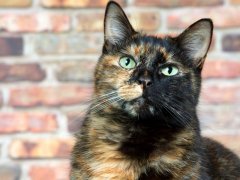Chalabala / Adobe Stock
Cats who stop using the litter box are not being naughty or spiteful—they need your help! NEVER punish your cat in any way. You will only make your cat fearful of you and worsen the problem. Don’t give up on your senior pet when they need you the most.
Toileting outside the litter box is often called inappropriate elimination or periuria. It can be different with every cat—some may urinate near their box while others prefer certain spots around the house. In this article, we’ll discuss the common reasons why your older cat is struggling to use the litter box and how to help them.
To begin finding a solution, you must first determine the reason. Common causes of litter box problems in senior cats are listed below and separated into medical and behavioral reasons.
Medical Causes of Inappropriate Elimination
Aging cats are susceptible to many ailments that can result in incontinence. Pixel-Shot / Adobe Stock
A veterinary visit is essential if your older cat’s behavior has changed. Underlying medical issues must be ruled out before focusing on behavioral modifications. Your vet will examine your cat, conduct blood and urine tests, and formulate a treatment plan.
1. Increased Thirst and Urination
Senior cats may develop polydipsia, which is increased drinking, and subsequently, polyuria, which is increased urination. This may cause them to pee outside their litter box and have accidents. These symptoms may be caused by chronic kidney disease, diabetes mellitus, hyperthyroidism, or liver disease, to name a few. Your veterinarian will conduct blood and urine tests to identify the cause.
2. Feline Lower Urinary Tract Disease
Feline idiopathic cystitis and urinary tract infections are painful conditions that cause increased frequency and urgency of urination. Cats may urinate outside their litter box and around the house. They may urinate small drops at a time (sometimes tinted red with blood) or become incontinent and unable to hold it. This requires urgent veterinary treatment. They’re usually diagnosed based on symptoms and analyzing a urine sample. X-rays and ultrasound may be performed to rule out bladder stones.
3. Gastrointestinal Issues
Constipation and diarrhea in cats may cause excessive straining and discomfort while pooping. This may increase how often they need to go and cause them to have accidents outside their litter box. Older cats are prone to constipation—this is a serious medical condition that needs prompt treatment and long-term management.
4. Limited Mobility
Mobility declines in cats as they age. Over 90% of cats over the age of 12 will show signs of arthritic change. Some signs include sleeping more, difficulty jumping, or limping when walking. Nerve pain and arthritis are even more common in declawed cats.
Arthritic cats may find it difficult to get to their litter box in time—and to climb into the litter box. If they struggle to get into the box, they may toilet just outside of it instead. Cats with painful conditions, such as arthritis, will need pain relief as part of their treatment plan.
5. Feline Cognitive Dysfunction
Senior cats are at risk of developing feline cognitive dysfunction, similar to dementia in humans. This condition can make cats forget things, including their toilet training and where their litter box is. It’s not uncommon for cats with this condition to toilet outside of their litter box. They will also have other symptoms such as pacing, staring at walls, vocalizing, and vacant expressions.
6. Impaired Vision
Eyesight declines in all animals as they age. High blood pressure in cats (hypertension) can even cause sudden blindness. Whether cats have reduced vision or complete blindness, it may cause them to have difficulty locating their litter box.
Behavioral Causes of Inappropriate Elimination
The choices you make for your senior cat’s environment make a big impact on their comfort level. Oleg Opryshko / Adobe Stock
Treating medical issues should help solve litter box problems, but they may still need environmental modification. Older cats may be slower than they were as younger cats, so it makes sense that we may need to modify their environment to make things easier for them. Addressing these causes may help senior cats:
1. Stress in Cats
One common reason for inappropriate urination is stress. Cats are often stressed by big changes, such as moving house, construction, conflict between pets, a new pet or family member, or even the loss of a family member. These stressors may prevent your cat from using the litter box and can also cause spraying in cats.
Ensure that all pets have enough resources to reduce competition. Plug in a synthetic pheromone diffuser to reduce stress and help your cat feel more secure in their home. Consult a feline behaviorist or your vet if the situation isn’t improving or is complicated and your cat is showing visual signs of stress.
2. Litter Box Location
Litter box location is crucial. Cats like their litter boxes in private, low-traffic areas, away from other pets and children. If not, they may be uncomfortable using it and avoid it altogether. And if there is only one litter box in a large or multi-story home, older cats may struggle to get there and opt to go somewhere else.
Aim to have at least one litter box per cat, plus one extra, and put them in easily accessible locations. Try not to move your litter boxes around, as cats with cognitive dysfunction or poor eyesight may have trouble finding them.
3. Litter Box Type
Litter boxes for senior cats should have a dropped entry for easier access for cats with limited mobility or arthritis. They should also be big enough for your cat to turn around. If your cat has coordination trouble and tends to overshoot the box, a high-walled box can help. Covered litter boxes can be an issue in multi-cat households, as covered litter boxes may trap cats if they’re being ambushed by another cat.
4. Cat Litter Material
Cats are sensitive about the litter in their box. If they don’t like it, they won’t use it. Cats like fine, non-scented, clumping litter. The size of the litter material can be an issue in some older cats as they may find bigger, harder litter (e.g., pellets) difficult to walk on, especially if they have arthritis.
5. Litter Box Cleanliness
Cats will toilet elsewhere if their litter box and surrounding area are too dirty or smelly. (Wouldn’t you?) Litter boxes must be clean, scooped daily and emptied a few times per month. My senior cat is currently experiencing inappropriate elimination, so I scoop her litter box just about every time she uses it. Just avoid using harsh, fragrant products that may also offend your cat.
Frequently Asked Questions
Why is my cat not using the litter box but acting normal?
Cats are infamous for hiding their pain. If your cat isn’t using their litter box, there is something wrong with their health or the litter box. Schedule a check-up with your veterinarian to rule out medical conditions.
What tests will the veterinarian perform?
Your veterinarian will perform a physical exam and ask how long your cat has been experiencing symptoms. Senior cats require bloodwork twice annually, so they will likely draw blood for a senior blood panel. Depending on symptoms, they will also draw a sample of urine for a urinalysis and urine culture, or they may ask you to bring in a fecal sample. Bloodwork, urinalysis, and fecal test results may take 1–3 days and urine culture results may take a week or more.
Why is my cat messing up her litter box?
Try using a bigger litter box with high sides and a good litter mat. Maintain enough litter for your cat to dig in and cover their waste properly.
-
Hardie, E. M., Roe, S. C., & Martin, F. R. (2002). Radiographic evidence of degenerative joint disease in geriatric cats: 100 cases (1994–1997). Javma-journal of the American Veterinary Medical Association, 220(5), 628–632.
-
Sordo, L., & Gunn‐Moore, D. (2021). Cognitive Dysfunction in Cats: Update on neuropathological and behavioural changes plus clinical management. Veterinary Record, 188(1).
